- Home
- Perry Rhodan
The Radiant Dome Page 2
The Radiant Dome Read online
Page 2
They walked past the brightly humming barrel shaped reactor, which had supplied the energy for the force ever since they had landed here. Once again Perry Rhodan tried to penetrate the shielding plates with his imagination in order to comprehend its function. Rhodan was a nuclear physicist and an astronaut. Although he grasped every detail of the nucleo-chemical engines of the Stardust, here he seemed to face an insurmountable wall. All his Earthly scientific schooling came to naught when faced with the alien's superior technology. All he knew was that the energies of a small sun were set free in the "Hot" part of the Akonide reactor. This was probably based on an incredibly complicated process of fusion of the carbon cycle, which was as far removed from the fission reaction known and used by Earth's scientists as is Stone Age axe from a rocket machine gun.
Khrest had made the assertion that this apparatus, which stood no higher than six feet, was capable of supplying the entire industry of the world with electric current. Rhodan felt dizzy simply trying to figure out the immense, potential. He gave up, as he had done before, trying to comprehend the superhuman achievements of the Arkonide race. For the time being he could do nothing but accept the fact that the reactor did work.
Heavy cables, as thick as a man's arm, led upward to the strange looking spherical antenna that radiated the huge dome of energy. The dome had a diameter of almost two and a half miles at its base and was a mile and a quarter high at its apex.
Six weeks had gone by since they had found the gigantic space sphere on the moon during the first manned lunar expedition. About six weeks should be entirely sufficient to let the great minds of Earth arrive at rather dangerous conclusions. By now they probably had seen through Rhodan's fairy tales about discovering the remains of an alien culture on the Earth's natural satellite. They were no fools! These men of the military and scientific commands of the mighty power blocs were smart thinkers. And if they all banded together in the face of common danger, the situation would begin to turn critical for the crew of the Stardust and its guests.
Perry Rhodan became aware of the questioning glances of his men, who kept observing him. Dr. Haggard's shadow was invisible on the curtain that divided the back part of the room. Quite obviously he had given a set of protective earphones to the alien who was resting there.
Rhodan's face assumed an impervious expression. For the past few days he bad been walking about with hunched shoulders, which made his lean, tall body seem to shrink somehow. Reg was observing him with increasing alarm. Once their commander started losing his cool, everything threatened to go to pieces. Even he, Reginald Bell, was not the right man to lead to its proper conclusion the plan that had been initiated. He was far too impulsive for such a task. Dr. Eric Manoli, physician on board the Stardust, would have been entirely unsuited to carrying on the daring enterprise. His qualifications were purely medical and scientific; he was completely lacking the ability to give uncompromising orders.
Captain Clark G. Fletcher had disappeared without a trace a week earlier. Rhodan was certain that Fletch, the fourth man of the Stardust's original team, must have encountered great difficulties–and possibly foul play. It was even quite probable that he was no longer alive. How utterly wrong had been his decision to permit Fletch to return home! It simply could not end well!
Rhodan's mouth formed a firm thin line. Since he bad not plugged his walkie-talkie in again, this was a hint for Reg not to question him any further. Instead, Reg's hand grasped, with an unconscious move, the silvery rod that he knew to conceal undreamt of powers.
It was the so-called psychoradiator of the Arkonides, a weapon that could block the conscious will of other people and force them to execute acts contrary to their own conviction.
This instrument was relatively harmless, though. It did not leave any damaging psychological aftereffects; neither did it put any undue strain on the target's mind. Unfortunately for Rhodan's men, the psychoradiator had already lost its initial element of surprise. The "other side" had recognized that the instrument's range was limited to about a mile and a quarter.
Thus the Third Power, as the Stardust's crew had lately come to be known, had been forced into a defensive position.
Rhodan walked past Dr. Haggard's special mobile laboratory, which had arrived barely a week ago. Reg shrugged his shoulders in answer to Rhodan's ironic glance. Reg was certain that he could not have brought the doctor through enemy territory under the present circumstances. But what did it matter now, as long as he had managed to bring Dr. Haggard here and, more important, perhaps, had brought along the means to cure Khrest?
Absentmindedly Perry Rhodan's right hand slid over to his left shoulder. It should have encountered the military insignia of his handsome uniform of the U.S. Space Force. But in a flash he remembered that he himself had detached them. There was no longer a Major Rhodan, particularly since he had been officially deprived of his military rank via radio communication. Rhodan had become World Enemy Number One.
Carefully he drew aside the curtain. Dr. Manoli approached him. Quickly he plugged in the cables to establish communication between them.
"Don't worry any more than necessary," Dr. Manoli said calmly over the ear protectors' speakers. "He is feverish, of course. We were all prepared for this, that a biologically divergent alien being would not respond in the same manner to our medications as we would. His blood count is not unfavorable. The abnormal increase of his white blood cells went down soon after the first injection of Dr. Haggard's anti-leukemia serum. The disease has at least been arrested. The swelling of his glands and the subcutaneous bleeding are subsiding. But we can't explain the strange site effects. They never occur in human patients. But in the meantime we have learned a great deal about Khrest's organism.
"His metabolism is similar to ours. He also breathes oxygen, and his lungs let this life sustaining gas diffuse into his bloodstream. Both Dr. Haggard and myself," continued Dr. Manoli, "are agreed on this point. We administered the serum only after the most careful examinations. He will get his second injection within the hour."
"Despite the considerable side effects?"
"Despite them," nodded Dr. Manoli briefly. His face grew stern. "We can't avoid risks completely. Haggard is an outstanding specialist but not a magician. These side effects are well within our ability to control. Just pray that Khrest's organism does not suddenly collapse. Yet his circulatory system seems unusually stable. Perhaps this is due to the one organ in his body that we don't have, unfortunately. We have located a fabulously constructed pressure regulator above his heart, Our diagnostic instruments have analyzed it to become effective with the first signs of impending circulatory collapse by balancing and eliminating any constrictions of blood vessels or closing of capillaries. What a surprising body, hardly to be expected in a member of such a degenerated race. We are dealing here with supremely intelligent minds that are unable to make the necessary effort to transform their brilliant knowledge into practical deeds because they lack willpower. That seems to be at the root of their trouble, Commander Rhodan."
"Forget that bit about 'Commander'!"
"For me you will always remain the commander. The way it looks now, we have well founded hopes that Khrest will recover one hundred percent."
Rhodan looked at the incredibly young appearing face of the patient, whose forehead was bathed in fine pearls of sweat. Khrest was not a child of this planet; still he was capable of perspiring. A good sign, according to Dr. Manoli. Rhodan turned away. The high intensity barrage kept on incessantly. Strong concussions caused the ground to shake. It was as if the enemy exploded their heaviest charges in the air just at the outer limits of the protective energy bell.
"I don't like it," whispered Reg. "They must be planning something. It almost seems as if these fire tricks are nothing but an attempt at diversion."
"If only we could ask Khrest if the energy screen will withstand these constant impacts indefinitely," said Rhodan. "Eric, could you rouse Khrest out of this semi-conscious state for just a f
ew moments?"
"Absolutely impossible," said the physician. "This would be the greatest mistake we could make."
"You are quite right there," confirmed Rhodan. Then he began to smile softly. Reg felt a shiver run down his spine. He was well acquainted with Rhodan's infamous gentleness, which usually ended suddenly in hard, ruthless action.
"If Khrest fails to recover, we are in for hell," stated the commander with apparent composure. "A hell worse than Hades, my dear friends! I have landed the Stardust here in the Gobi Desert against all orders. I have refused to surrender Khrest. I have kept emphasizing that none of the power groups of this world could obtain his superior scientific technological knowledge for its own purposes. We have suppressed an imminent atomic war, and we have made fun of the mighty armies with the help of the aliens' superior defensive, weapons. They won't forget this so easily. The great power blocs of this planet have united against us. Up there on the moon, the alien woman commander of a gigantic space battleship is waiting for us to cure Khrest. These aliens left their distant worlds only for the purpose of searching for a planet, somewhere within the regions of our galactic position, that is supposed to possess the secret of biological cell regeneration. That would mean eternal life for Khrest. They want to preserve forever the brain of this genius.
"Thora, the female commanding officer, has also remained mentally active, like many of the women of her race. But she despises mankind because of our primitive level of development. Unless we succeed in restoring the health of this member of her race, we shall suddenly overnight confront the elite divisions of an outraged mankind, helpless and all alone. Then it will be curtains for our Third Power. Well, have I made myself clear?"
"Perfectly clear," replied Reginald Bell. "Crystal clear, my friend! In the event Thora withdraws, we will first pass through the cross-examinations of the Secret Service. This will be followed by an international court of justice."
"I can't see any criminal act in this, not even a mistake," said Dr. Manoli with calm. "It can never be wrong to act in the interest of all mankind. And this is exactly what we are doing. Haven't we accomplished a rapprochement overnight of the ideologically differing governments by a mere demonstration of our superior might. Is that nothing?"
"We managed to do that only thanks to Thora's superior power!" corrected Rhodan. "If Khrest should die, she will abandon us. Even if she can't start back to her home planet without our assistance, this will hardly disturb her. Fatalism is a characteristic of her race, after all. She will spin around herself a cocoon of an enormous field of energy, and she will reject as a matter of principle the idea of entering into relations with mankind. We have simply got to do something!"
"What?" The question came back sharply. Reg had reached that "certain point" of inner excitement.
"We ought to try to convince her that man is a tremendously ingenious creature," Rhodan said. "It won't be long until the enemy power possess nuclear weapons that can no longer be rendered harmless by an anti-neutron field."
Dr. Manoli turned pale.
Rhodan concluded without a trace of emotion, "Our secret research attempted to develop a 'cold' nuclear fusion process. If they should succeed, they no longer need worry about the anti-neutron field. Then I would not care to remain under this energy dome!" He squinted upward to where, far above the tent, the invisible energy screen formed a protective vaulted roof, against which the enemy s missiles were exploding like so many firecrackers. But that could change, and very quickly at that.
"Let's open our communication channel to Thora," said Rhodan with deliberation. "I urgently want to talk to her in my capacity as a representative of mankind who has to make a few demands in their favor."
"Demands," grinned Reg. "Did you say demands? She'd jump right out of the screen to scratch out my eyes. We are nothing but semi-intelligent monkeys, from her exalted point of view. According to her code she cannot get in touch with us or establish any mutually meaningful relationship. The affair with Khrest was a compromise she could barely tolerate.
Rhodan pulled over a small stool that had once been part of the equipment of an Asiatic transport commando. "If she has any drive for survival at all, she will listen and agree to my demands. Let's go; get the connection ready. You are our communications expert, after all."
Reg shrugged helplessly. Mumbling a curse under his breath, he disappeared behind the curtain. The peculiar videophone of the Arkonides had been set up near Khrest's couch. In any case, the roomy tent offered better accommodations for Khrest than did the tiny cabin of the Stardust.
"Do you intend to force her?" inquired Dr. Manoli worriedly.
"You guessed right," Rhodan replied slowly. "I have the impression that she is depending on Khrest far more than we imagine. I have noticed quite unmistakably that he is the one who gives the orders. I am no longer willing to play along with her with all that nonsense! Where will all this lead to if we have to beg her for help with every new incident? The moon is too far away for my taste under such circumstances. In case of emergency we shall lose decisive minutes and seconds, I need much more effective equipment here, with some offensive arms included. Please, no more questions now. If the things I suspect, way back in some secret corner of my mind, should happen, then Thora will snap to it. She underestimates the human race enormously. She simply can't believe we are capable of anything, which I consider a grave mistake on her part."
"I don't follow you," said Eric Manoli.
"You ought to think about it." Rhodan smiled sarcastically. "What do you do as a physician when a patient complains about some terrible pain? Do you give him constant morphine injections, or do you try to find the cause of his discomfort and treat the disease itself, rather than its symptoms?"
"Why, get to the root of the evil, of course."
"There you are," grinned Rhodan joylessly. "You got the point, The secret services of the great power blocs will also search for the root, which in this case is hidden on the moon. Or do you really think they still believe our fairy tales?"
Reg motioned to them. His bitter grimace could only mean that communication with the moon had been established.
Rhodan rose slowly and walked over to the curtained off partition. He stepped in front of the oval screen of the Arkonide videophone. The aliens' vessel was on the far side of the Moon, the side normally out of sight from Earth. Contact therefore could never have been established by radio. When Khrest bad been asked about this, he had only answered briefly that the faster than light radio technique of the Arkonides had long ago overcome such difficulties.
For an Earth engineer it was rather hard to accept such explanations. Mountains of further questions arose that, of course, were of more interest to the expert than to the layman.
On the screen appeared Thora's face-a three dimensions color picture of unique expressiveness. Thora was beautiful, breathtakingly beautiful, and yet of a startling impersonality in her self-imposed lack of warmth. Rhodan stared in fascination at her white blonde hair which formed a vivid contrast to her reddish golden eyes. Nevertheless, she was not an albino; this was just a characteristic of the Arkonide race,
Though Rhodan had been willing to address her just a moment ago with moderate words and to excuse her attitude by considering her upbringing, when he saw her expression he suddenly changed tactics.
"Just forget to explain to me that the time for our daily report has not yet come," he said sharply in place of a greeting. "Just listen closely and remember that I am no longer a pawn on your chessboard. If you are unable to remove the slight damages in the engines of your super spaceship in order to get it ready to start again, then you must consider yourself also incapable of impressing a human scientist and special soldier with your foolish behavior. The men of my race have more willpower and daring in their little fingers than your drowsy crew in all their decadent, hollow heads. And if your answer is simply to break off contact now, I shall switch off the energy screen at once. Did you want to say something?"
/> She stared at him speechlessly. Never before had anyone dared to speak to her, the commanding officer, in such a manner. But she did not break off communication.
Rhodan continued, "And now, will you pay close attention to what I have to say to you, madam! I…"
Reg became convinced that his former commander had gone crazy. He had assumed an attitude as if he were the chief of the powerful empire of the stars that Khrest once had referred to as the "Great Imperium." Rhodan seemed to overlook the fact that the planet Earth was nothing but a tiny speck within the Milky Way, just like a grain of sand in the Gobi Desert. Perhaps even less. Reg was certain that this could come to no good end.
CHAPTER TWO
PARTNERSHIP and defense union mean neither more nor less than a genuine relationship of trust between the concerned parties.
When a worldwide union creates a special secret defense organization, the headquarters of such a group must be a a central position within easy reach of all concerned nations.
That is why the IIA, the International Intelligence Agency, had chosen the island of Greenland as a geographically favorable spot. The gigantic center of the NATO Defense had been built deep under the ground.
Allan D. Mercant was the all powerful chief of the IIA, responsible only to the Defense Union. The short, slender, unobtrusive looking man with the tanned, boyish face below a high domed forehead was a very peaceful person as far as the animal kingdom was concerned.
Allan D. Mercant could easily have passed for the president of the Society for the Prevention of Cruelty to Animals. He would have seemed in the right place if one could have observed him roaming the dense Canadian forests, his eyes shining and his camera poised to shoot.
Mercant was not at all in favor of hunting with a shot-gun. This conflicted with his principles. His professional activities were therefore all the more astonishing. Malicious tongues bad occasionally asserted that the well-being of one little animal mattered more to him than the life of any of his numerous secret agents. This was of course far re-moved from the truth, and Mercant was inclined to brush off such sarcastic remarks with a mild wave of his hand, while his eyes sparkled with amused irony.

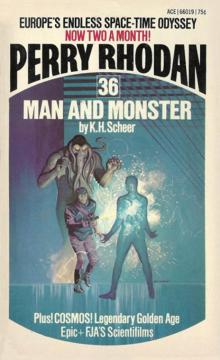 Man and Monster
Man and Monster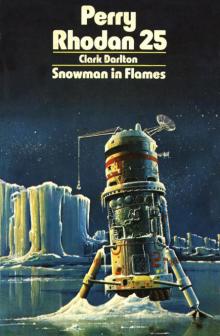 Snowman in Flames
Snowman in Flames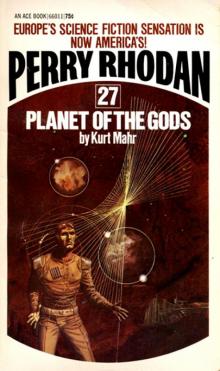 Planet of the Gods
Planet of the Gods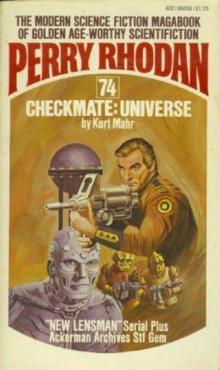 Checkmate Universe
Checkmate Universe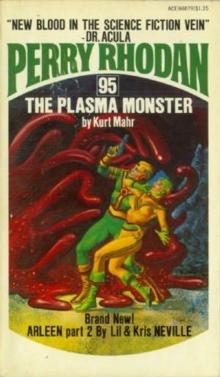 The Plasma Monster
The Plasma Monster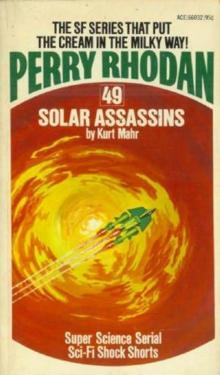 Solar Assassins
Solar Assassins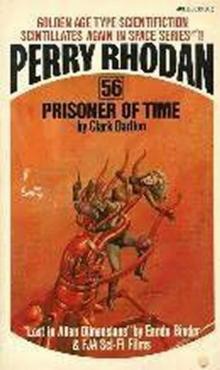 Prisoner of Time
Prisoner of Time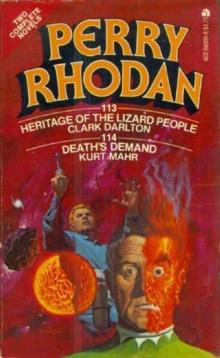 Death's Demand
Death's Demand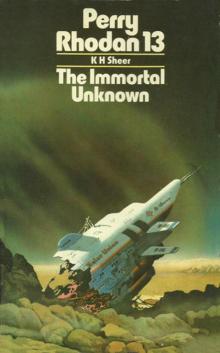 The Immortal Unknown
The Immortal Unknown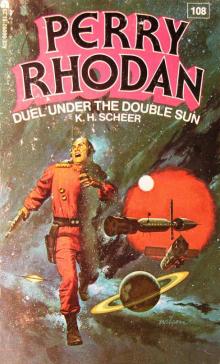 Duel Under the Double Sun
Duel Under the Double Sun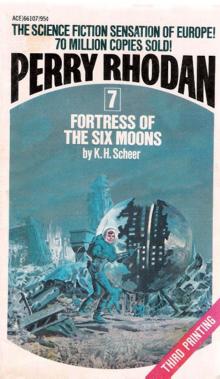 Fortress of the Six Moons
Fortress of the Six Moons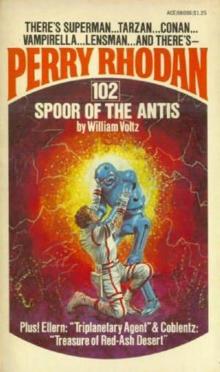 Spoor of the Antis
Spoor of the Antis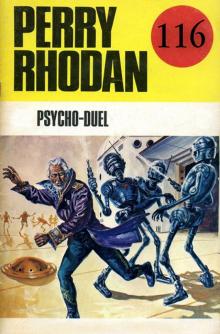 The Psycho-Duel
The Psycho-Duel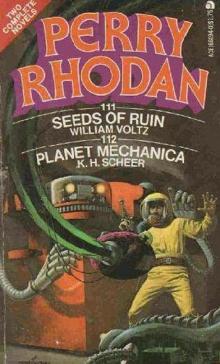 Planet Mechanica
Planet Mechanica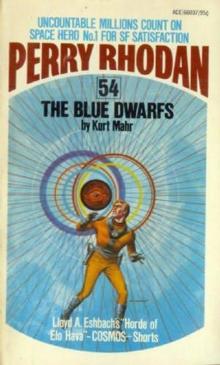 The Blue Dwarfs
The Blue Dwarfs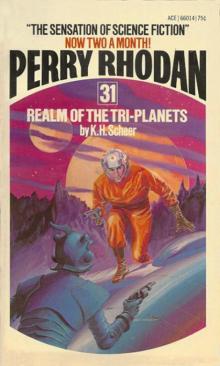 Realm of the Tri-Planets
Realm of the Tri-Planets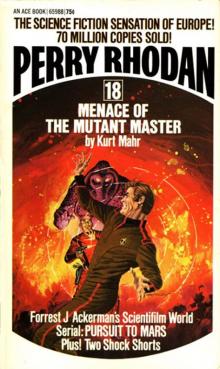 Menace of the Mutant Master
Menace of the Mutant Master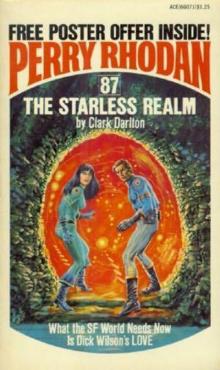 The Starless Realm
The Starless Realm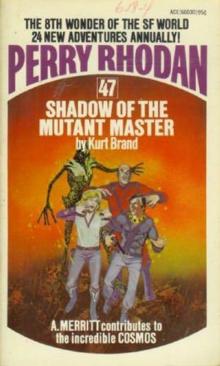 Shadow of the Mutant Master
Shadow of the Mutant Master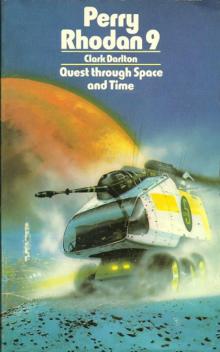 Quest Through Space And Time
Quest Through Space And Time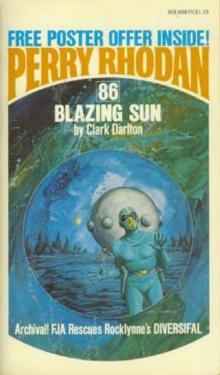 Blazing Sun
Blazing Sun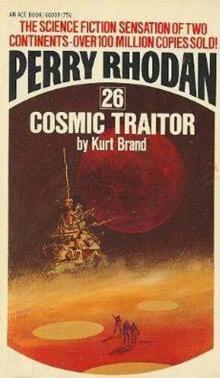 Cosmic Traitor
Cosmic Traitor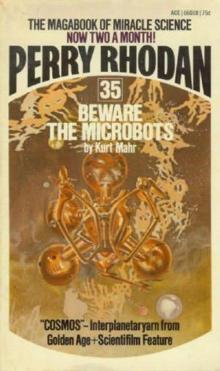 Beware the Microbots
Beware the Microbots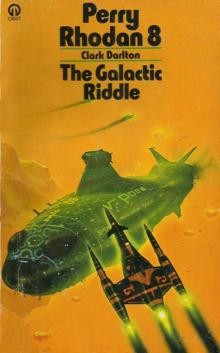 The Galactic Riddle
The Galactic Riddle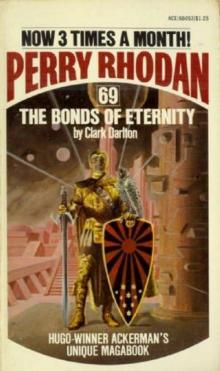 The Bonds of Eternity
The Bonds of Eternity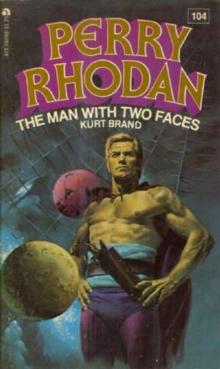 The Man With Two Faces
The Man With Two Faces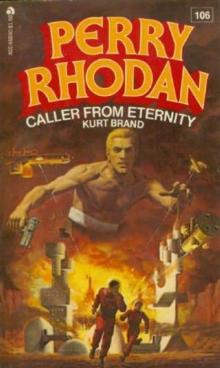 Caller from Eternity
Caller from Eternity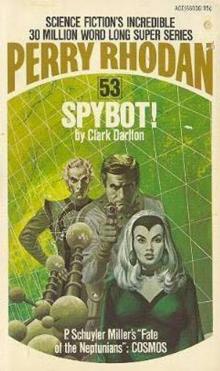 Spybot!
Spybot!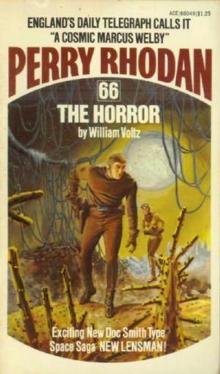 The Horror
The Horror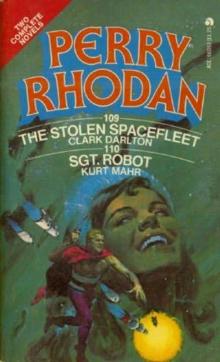 The Stolen Spacefleet
The Stolen Spacefleet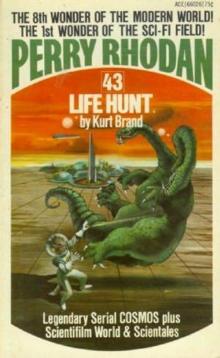 Life Hunt
Life Hunt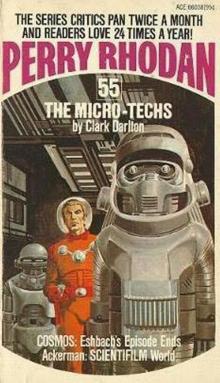 The Micro-Techs
The Micro-Techs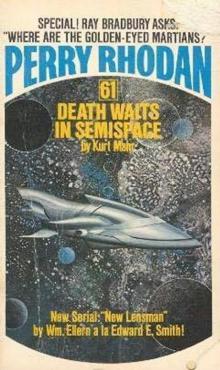 Death Waits in Semispace
Death Waits in Semispace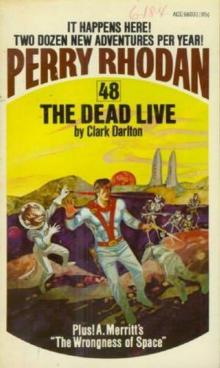 The Dead Live
The Dead Live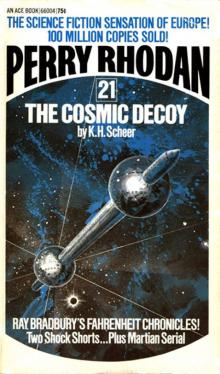 The Cosmic Decoy
The Cosmic Decoy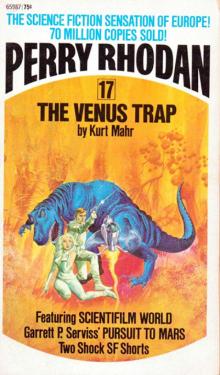 The Venus Trap
The Venus Trap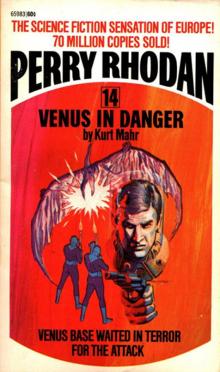 Venus in Danger
Venus in Danger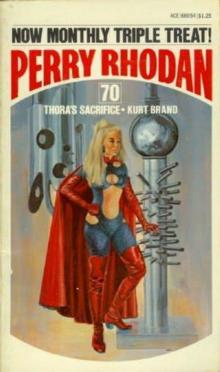 Thora's Sacrifice
Thora's Sacrifice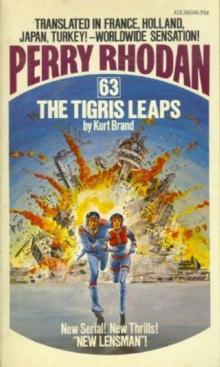 The Tigris Leaps
The Tigris Leaps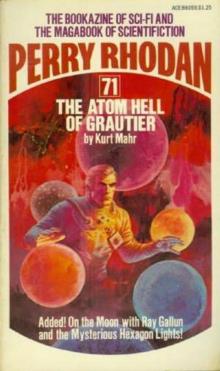 The Atom Hell of Grautier
The Atom Hell of Grautier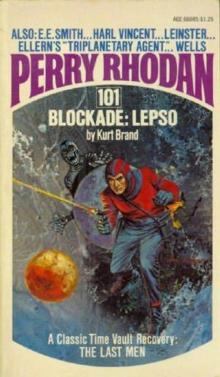 Blockade: Lepso
Blockade: Lepso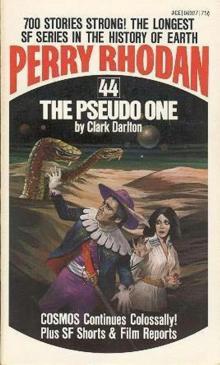 The Pseudo One
The Pseudo One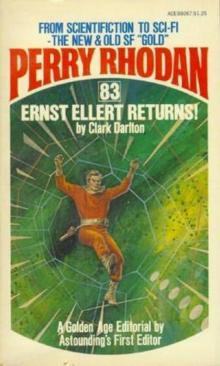 Ernst Ellert Returns
Ernst Ellert Returns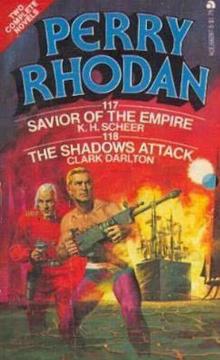 Savior Of The Empire
Savior Of The Empire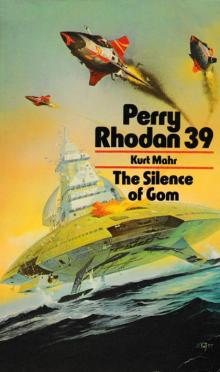 The Silence of Gom
The Silence of Gom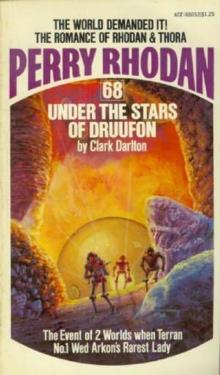 Under the Stars of Druufon
Under the Stars of Druufon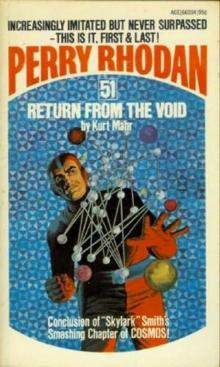 Return from The Void
Return from The Void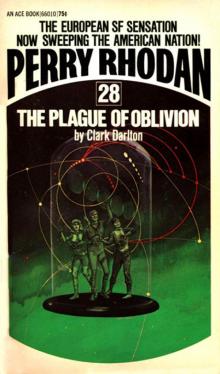 The Plague of Oblivion
The Plague of Oblivion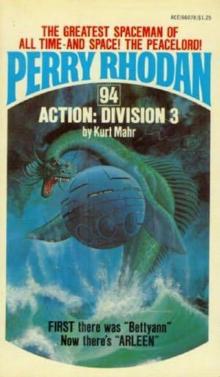 Action Division Three
Action Division Three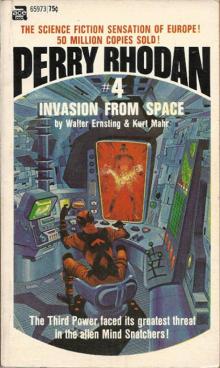 Invasion From Space
Invasion From Space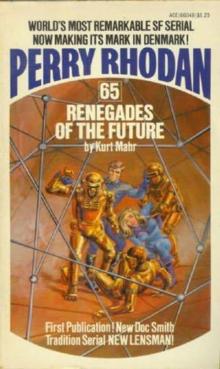 Renegades of the Future
Renegades of the Future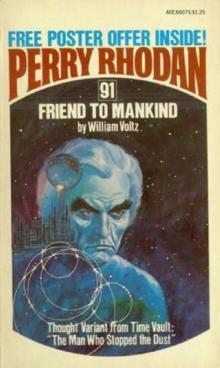 Friend to Mankind
Friend to Mankind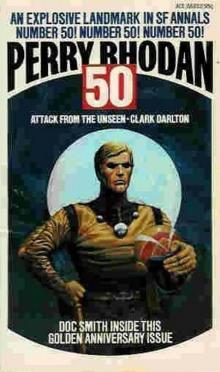 Attack from the Unseen
Attack from the Unseen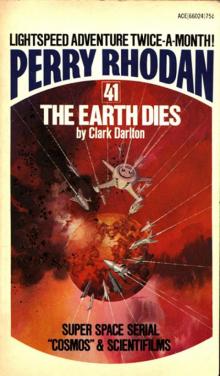 The Earth Dies
The Earth Dies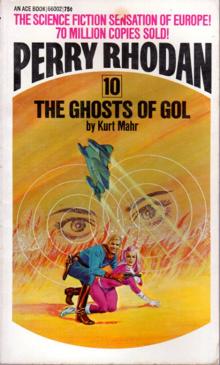 The Ghosts of Gol
The Ghosts of Gol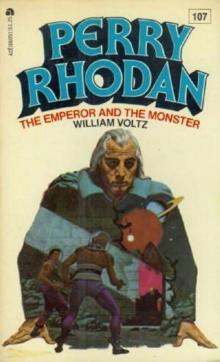 The Emperor and the Monster
The Emperor and the Monster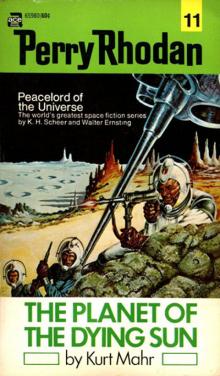 The Planet of the Dying Sun
The Planet of the Dying Sun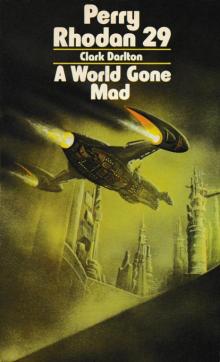 A World Gone Mad
A World Gone Mad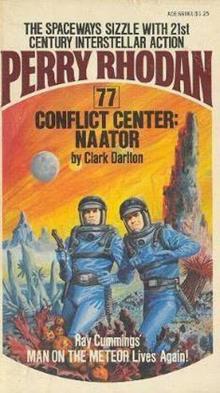 Conflict Center Naator
Conflict Center Naator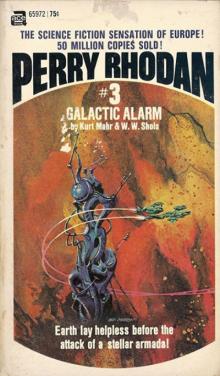 Galactic Alarm
Galactic Alarm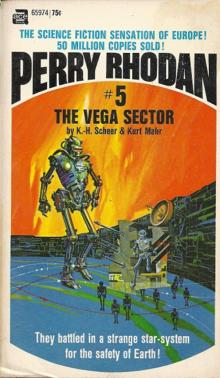 The Vega Sector
The Vega Sector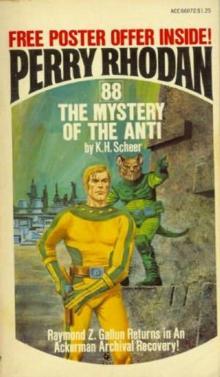 Mystery of the Anti
Mystery of the Anti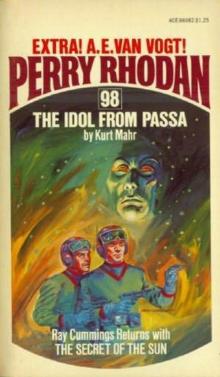 The Idol from Passa
The Idol from Passa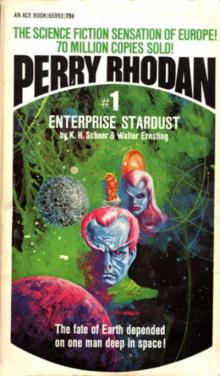 Enterprise Stardust
Enterprise Stardust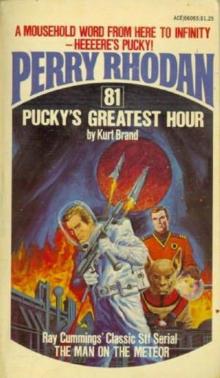 Pucky's Grestest Hour
Pucky's Grestest Hour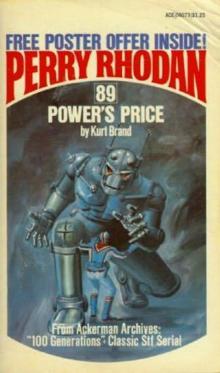 Power's Price
Power's Price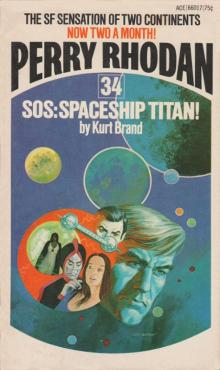 SOS Spaceship Titan
SOS Spaceship Titan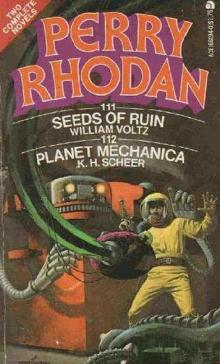 Seeds of Ruin
Seeds of Ruin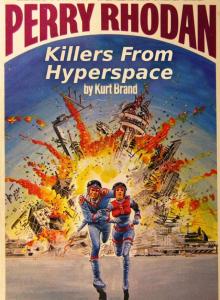 Killers From Hyperspace
Killers From Hyperspace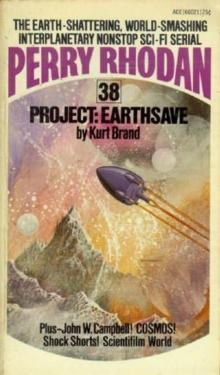 Project Earthsave
Project Earthsave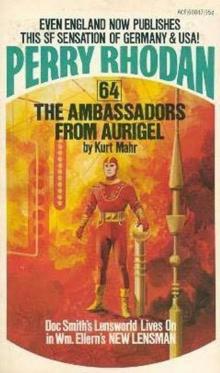 The Ambassadors from Aurigel
The Ambassadors from Aurigel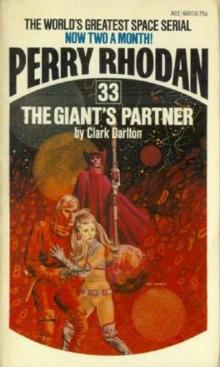 The Giant's Partner
The Giant's Partner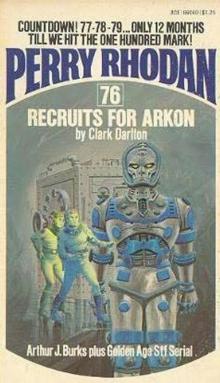 Recruits for Arkon
Recruits for Arkon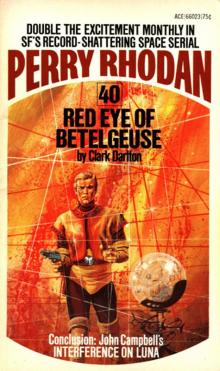 Red Eye of Betelguese
Red Eye of Betelguese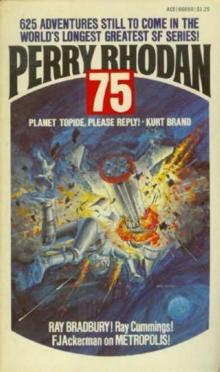 Planet Topide Please Reply
Planet Topide Please Reply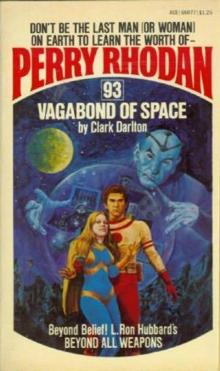 Vagabond of Space
Vagabond of Space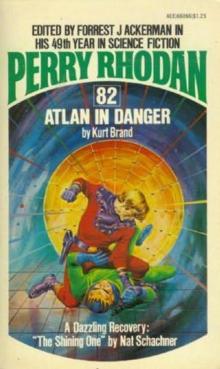 Atlan in Danger
Atlan in Danger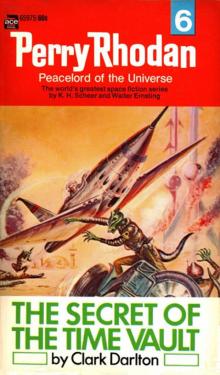 The Secret of the Time Vault
The Secret of the Time Vault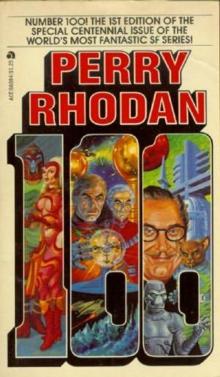 Desert of Death's Domain
Desert of Death's Domain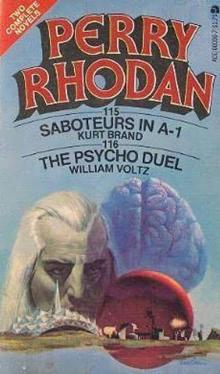 Saboteurs in A-1
Saboteurs in A-1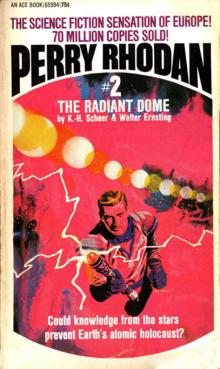 The Radiant Dome
The Radiant Dome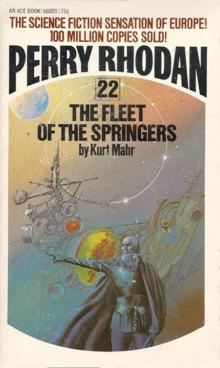 The Fleet of the Springers
The Fleet of the Springers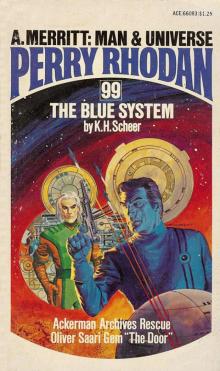 The Blue System
The Blue System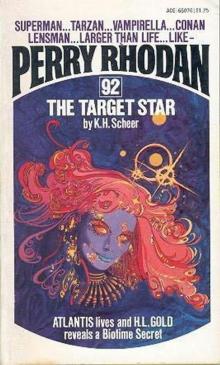 The Target Star
The Target Star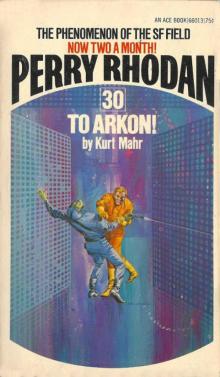 To Arkon!
To Arkon!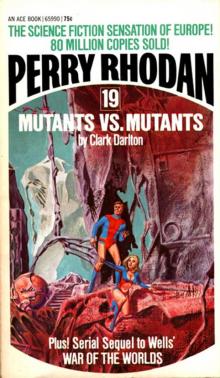 Mutants Vs Mutants
Mutants Vs Mutants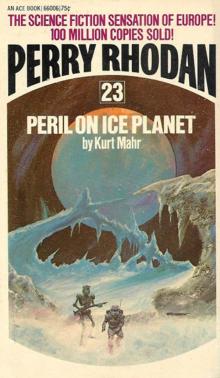 Peril on Ice Planet
Peril on Ice Planet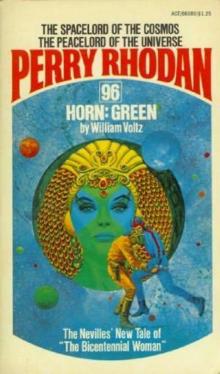 Horn: Green
Horn: Green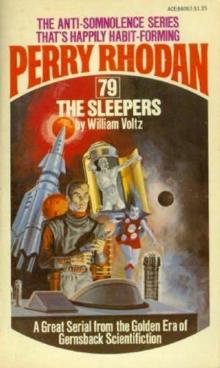 The Sleepers
The Sleepers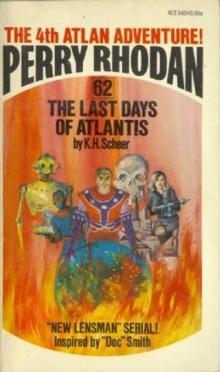 The Last Days of Atlantis
The Last Days of Atlantis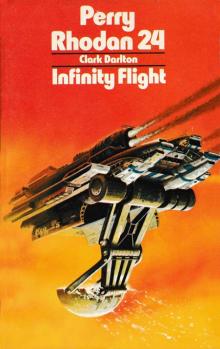 Infinity Flight
Infinity Flight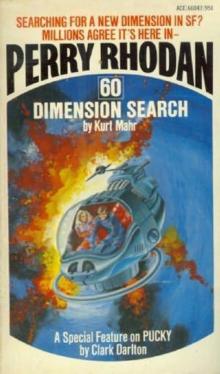 Dimension Search
Dimension Search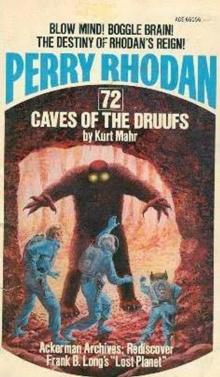 Caves of the Druufs
Caves of the Druufs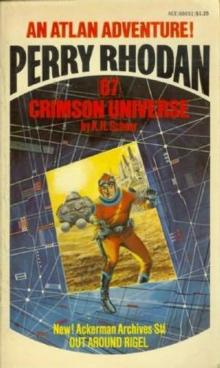 Crimson Universe
Crimson Universe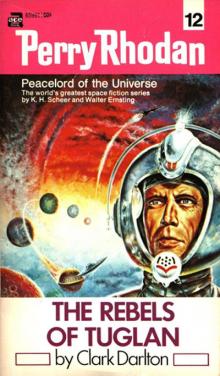 The Rebels of Tuglan
The Rebels of Tuglan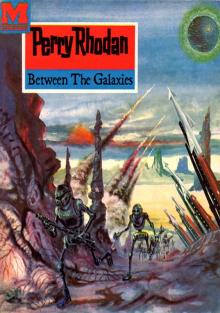 Between The Galaxies
Between The Galaxies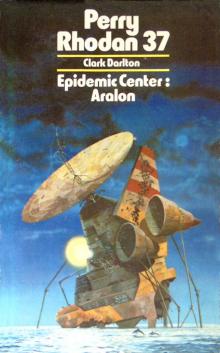 Epidemic Center Aralon
Epidemic Center Aralon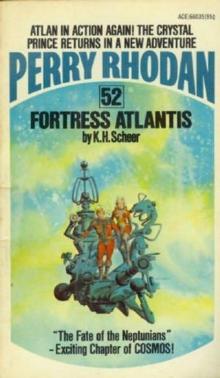 Fortress Atlantis
Fortress Atlantis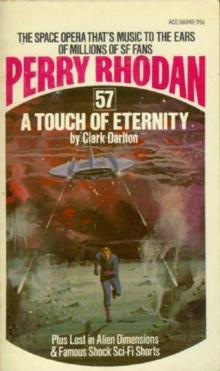 A Touch of Eternity
A Touch of Eternity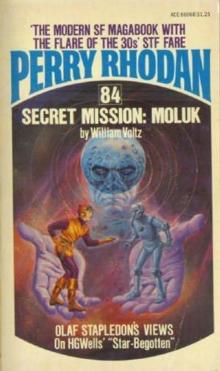 Secret Mission Moluk
Secret Mission Moluk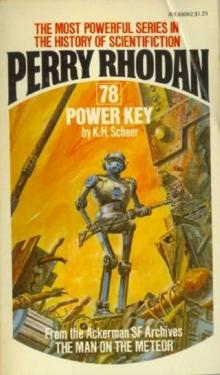 Power Key
Power Key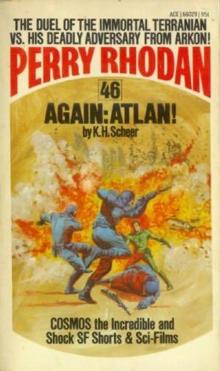 Again Atlan
Again Atlan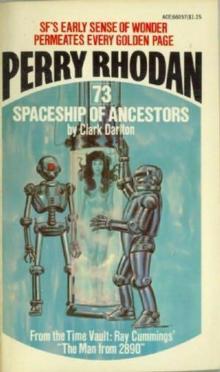 Spaceship of Ancestors
Spaceship of Ancestors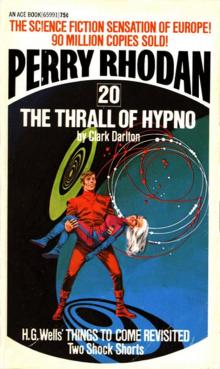 The Thrall of Hypno
The Thrall of Hypno